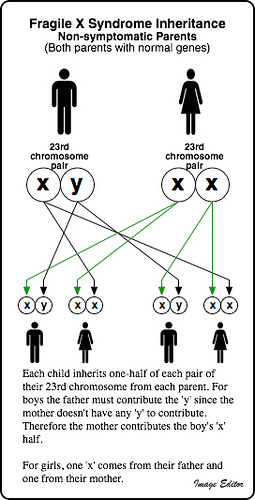A human body cell, such as those that make up skin, kidney tissue, heart tissue and blood vessels all contain 46 chromosomes. The chromosomes are arranged in pairs, so that each cell has 23 pairs. In females, each of the pairs are identical but in males, one pair, the sex chromosomes are different. While women have two X chromosomes, men have and X chromosome and a Y chromosome.
Each chromosome contains, on average, 4000 genes and in total, the human genome consists of about 30 000 genes.
There are two cell types that are exceptions to the rule of having 23 pairs of chromosomes - gametes, otherwise known as sex cells have only 23 individual chromosomes - they have half the normal complement of genes and chromosomes. This is because when the female gamete, the egg, is fertilised by the male gamete, the sperm, the two individual sets of chromosomes come together to form a fertilised egg with the full 23 pairs, one pair from each parent.
Each chromosome contains, on average, 4000 genes and in total, the human genome consists of about 30 000 genes.
There are two cell types that are exceptions to the rule of having 23 pairs of chromosomes - gametes, otherwise known as sex cells have only 23 individual chromosomes - they have half the normal complement of genes and chromosomes. This is because when the female gamete, the egg, is fertilised by the male gamete, the sperm, the two individual sets of chromosomes come together to form a fertilised egg with the full 23 pairs, one pair from each parent.

